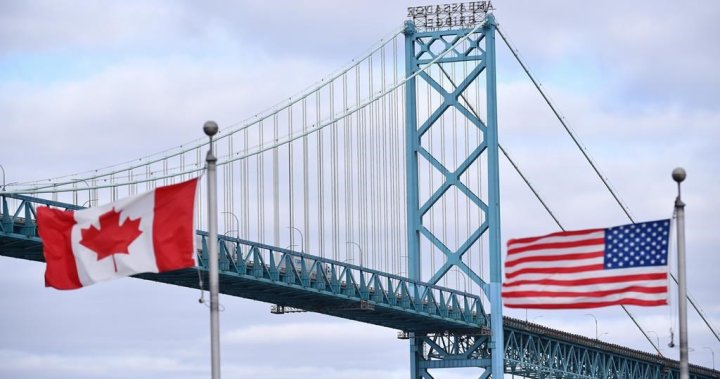Canadians will soon be able to drive to Disneyworld for a week-long vacation or make daily trips across the border to go shopping at an outlet mall or take in a sporting event or concert.
On Nov. 8, the U.S. will lift restrictions on Canadians driving across the border that have been in place since practically the start of the COVID-19 pandemic.
Read more:
Canada-U.S. land border to open for fully vaccinated on Nov. 8: official
With the border closed to drivers at the moment, traffic heading across is currently less than 15 per cent of what it once was, according to the Canada Border Service Agency.
For example, a million people drove across the border for the week of Oct. 11, 2019, whereas that number was just 144,603 this year.

While the CBSA does not track daily visits, well over half of those travellers were Canadians heading across the border and heading home.
So when the border does open, what should Canadians do before making the trip south of the border, specifically if they want to watch the Buffalo Bills play or hit a Target and come home on the same day?
Whether it be a day or a week, those who are looking to head across the border need to be fully vaccinated, though they will not be required to have a COVID-19 test in advance.
Canadians will need to be able to provide proof of vaccination if they are randomly selected to do so.
For Canadians looking to come home after a short trip, they will need to prepare in advance, according to a spokesperson for the CBSA.
“For short trips, that are less than 72 hours, Canadian citizens, people registered under the Indian Act, permanent residents and protected persons travelling to the United States are allowed to take their pre-arrival molecular test before they leave Canada,” Rebecca Purdy told Global News in an email.
“If the test is more than 72 hours old when they re-enter Canada, they will be required to get a new pre-arrival molecular test in the United States.”
Read more:
Canada-U.S. border reopening a chance for neighbours to ‘connect again’
She said the test can be submitted up to 72 hours in advance using the ArriveCan travel app or website.
Purdy noted that rapid tests will not be allowed to come into Canada.
“Antigen tests, often called ‘rapid tests,’ are not accepted,” Purdy said.
“Fully vaccinated travellers who are eligible to enter Canada continue to be subject to mandatory random testing on arrival.”
— with files from Global News’ Aaron D’Andrea
View link »
© 2021 Global News, a division of Corus Entertainment Inc.














































